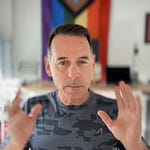“To know that you do not know is highest
To not know but think you know is flawed”1
In today’s video, I explore what moral relativism really means and how it can help us approach morality and ethics with an open and discerning mind.
I begin with a simple but challenging question: How do you know what’s right—and how do you know what’s wrong? This leads into a deeper reflection on whether moral truths are absolute or relative, and how curiosity, rather than certainty, can expand our understanding of right and wrong.
Morality vs. Ethics
I distinguish between the two: morality is how we lead ourselves—our personal compass of right and wrong; ethics is how we act and cooperate within community—how our personal values and beliefs translate into our relationships and choices in society.
The Limits of Absolute Morality
When we cling to absolute moral truth, we close our minds to context, complexity, and compassion.
Even simple moral statements like “do not kill” reveal nuance when we consider intention, circumstance, or necessity. To believe we hold the one moral truth is to stop questioning and to stop growing.
What Moral Relativism Really Means
Moral relativism doesn’t mean “anything goes.”
It means acknowledging that moral and ethical systems are human-made ideas; they are products of history, culture, and experience. It’s a perspective that invites humility, empathy, and self-examination, reminding us that our sense of right and wrong is shaped by where and how we live.
Four Practices of Open-Minded Morality
In the video, I share four ways moral relativism can deepen ethical awareness and leadership:
Suspend judgment and moral superiority. Examine your own values before condemning others.
Cultivate empathy and intercultural understanding. Seek to understand difference before defending your position.
Engage in moral reflection. Regularly question what you believe and why.
Foster dialogue and plurality. Replace debate with curiosity; value conversation over conviction.
Leading with Queer Integrity
For queer leaders and change-makers, moral relativism is not moral compromise, it’s moral maturity.
Leading with queer integrity means embracing multiplicity, seeing truth as lived and contextual, and refusing to replicate the moral rigidity that once excluded us. It’s the courage to stand for what feels right while staying open to what might still be learned.
“When we proclaim there is an absolute right or wrong morally, we agree to stop questioning the reasoning behind our own assumptions.”
Morality and ethics are living, evolving constructs—not absolute laws.
When we treat them as such, we invite deeper wisdom, greater empathy, and a more human approach to leadership and coexistence.
How do you lead ethically, authentically, and with conviction—even when your integrity as a queer person is challenged?
As a queer change-maker, your wisdom, leadership, and guidance are exactly what someone needs right now.
If you feel like you’re holding yourself back, let’s have a conversation about how you can create meaningful change and advance equity for our common humanity.
Lin, Derek, trans. Tao Te Ching: Annotated and Explained. Vermont: Skylight Paths, 2011








